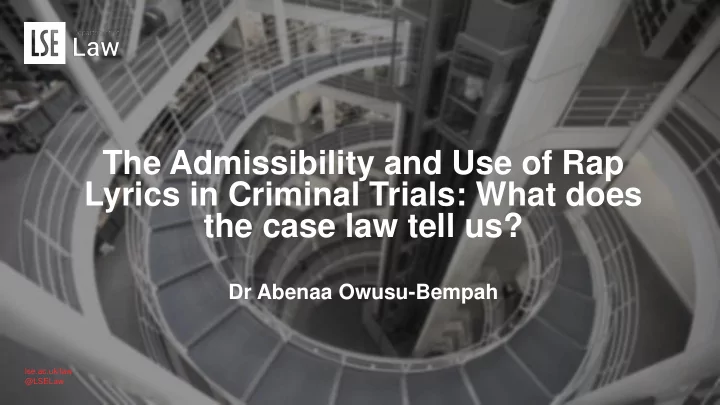

The Admissibility and Use of Rap Lyrics in Criminal Trials: What does the case law tell us? Dr Abenaa Owusu-Bempah lse.ac.uk/law lse.ac.uk/law @LSELaw @LSELaw
Case analysis • An exploration of the admissibility and use of rap lyrics and music videos as evidence in criminal proceedings in England and Wales • A doctrinal analysis of 30 reported cases on Westlaw lse.ac.uk/law @LSELaw
Key themes from the case law • Cases were reported between 2005 and 2020 . The most recent ten cases were reported between 2018 and 2020 • In 26 cases, the defendant(s) had been convicted of offences involving weapons and/or violence • In 22 cases, the offences were committed and tried in London • The vast majority of defendants were young , with most in their teens • The evidence was used exclusively against male defendants lse.ac.uk/law @LSELaw
Key themes from the case law • Lyrics and participation in videos was used almost exclusively as evidence against Black people • a deliberate tactic, drawing on stereotypical narratives about Black youth culture to construct case theories? • More than half of the cases concerned offences committed by way of joint enterprise • 21 cases were said to be gang related. Lyrics or videos were often used as evidence of gang association which was then used to link the defendant to a joint enterprise and/or as evidence to prove other issues in the case • E.g. R v Sode [2017] EWCA Crim 705 • This is concerning given the ill- defined and heavily racialised concept of ‘gangs’ lse.ac.uk/law @LSELaw
Key themes from the case law • Lyrics and videos were adduced as bad character evidence under s.101(1) the Criminal Justice Act 2003 or, in some cases, as evidence ‘to do with’ the alleged facts of the offence, under s.98 • The evidence was most often adduced under gateway d of the 2003 Act, as relevant to an important matter in issue between the defendant and the prosecution. The matter in issue was most commonly: intention; motive; or to rebut a defence, such as innocent presence lse.ac.uk/law @LSELaw
Key themes from the case law • Of the cases on Westlaw, all submissions that lyrics or videos should not have been admitted as evidence against the defendant, or used at sentencing, were unsuccessful • BUT there has been at least one successful challenge, see R v Alimi [2014] EWCA Crim 2412 • Little consideration or analysis of the relevance of the material • Discussion of fairness and prejudicial effect also tended to be sparse, with jurors being trusted to attach proper weight to the evidence, even without consideration of the broader context (e.g. cultural and musical conventions) lse.ac.uk/law @LSELaw
Summary • With some exception, the courts appear to take an uninformed and dismissive attitude towards the prejudicial effect of this kind of evidence, allowing prosecutors to use stereotypical narratives and racist imagery to construct a case theory, and taking rap literally in way that would be unthinkable with most art forms. lse.ac.uk/law @LSELaw
Recommend
More recommend